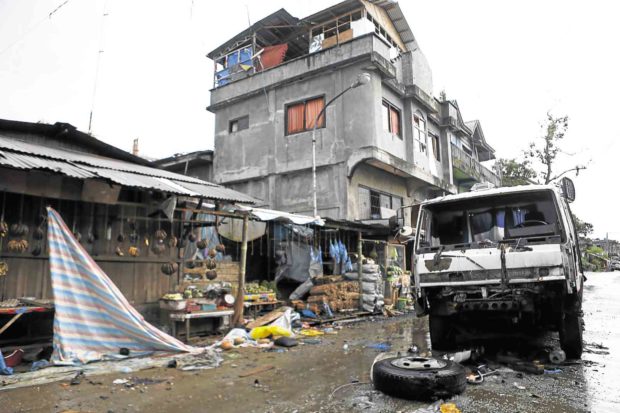
Destruction caused by the fighting in Marawi —JEOFFREY MAITEM
MARAWI CITY — The military said it was winning the war here after more than month of battling Islamic State-inspired militants, even as it admitted that the enemies continue to hold on to some strategic areas in the villages of Marinaut, Bangolo, Raya Madaya and Lilod.
“We are winning the battle as manifested by the number of war materials we recover daily. The Armed Forces is winning and the victory is irreversible,” Lt. Col. Jo-ar Herrera, the spokesperson of the Army’s 1st Infantry Division, said.
The military had so far suffered 70 deaths and over 400 injuries since the fighting broke out on May 23. It said nearly 300 terrorists had been killed, too – including two, who were from the Middle East – while over a dozen others had been arrested.
At least 360 high-powered firearms, along with various types of ammunition and explosive devices had also been recovered since fighting started.
Herrera earlier said the campaign against the Maute group and its allies was not an easy task, considering that the terrorists had occupied high-rise buildings.
“We appeal to everyone to continue to support and pray for our troops,” he said.
Herrera said another indication of the military’s imminent victory was the shrinking area being held by the gunmen.
He said at least 85 buildings previously occupied by the gunmen had been cleared.
“Inch by inch, we are moving into the center of gravity. They also lacked ammunition now and they have limited space for maneuver,” Herrera said.
“Troops continue to get deeper into the enemy-held positions as evidenced by recovered cadavers of terrorists and their firearms, as well as communication equipment and accessories,” he said.
Herrera said the offensive operation continued on Tuesday, along with the air strikes.
Retired Army Col. Pendatun Guro, a resident of the city, said the aerial strike was continuous since Monday evening.
In Tacurong City in Sultan Kudarat, the Marawi experience and the siege of Zamboanga had prompted the military to conduct a simulated exercise, wherein troops battled enemies in an urban setting.
Elements of the Army’s 33rd Infantry Battalion and operatives of Task Force Talakudong backed by four armored vehicles and a military ambulance sped through the national highway and immediately deployed soldiers in front of the “occupied” three-story building for the military operations in urban terrain (MOUT) exercise.
Working with precision as teams, two squads of soldiers “assaulted” the building while sniper and machine gun teams provided cover and support.
Lt. Col. Harold Cabunoc, the commander of the 33rd IB, said the building was “cleared” by the assault team within 10 minutes.
“The new trend of armed conflicts around the world is urban warfare. The Philippines has its own experience on urban warfare in the past 20 years. We are drawing valuable lessons from these conflicts,” Cabunoc said, citing also the Zamboanga City experience.
In 2013, hostilities escalated between government forces and Moro National Liberation Front combatants in Zamboanga City, which stretched for about three weeks.
The house to house running gun battle, resulted in the death of at least 12 civilians and 25 government forces while close to 200 MNLF fighters were also reportedly killed in the fighting.
The heavy fighting in the densely-populated area of Zamboanga displaced at least 100,000 people.
Aside from the military, the local police, traffic management officers and the members of the City Disaster Risk Reduction and Management Council of Tacurong City were also involved in the simulation exercise.
Cabunoc explained that the exercise was conducted to ensure a comprehensive response from the government in the event of a similar attack,
To further step up their preparedness and skills, Cabunoc said several soldiers under the 33rd IB also underwent trainings on sniping, Short Range Marksmanship, Close Quarter Combat, Combat Life Saver, Anti-Armor and Mechanized Infantry Operations in an urban environment.
Cabunoc stressed that while military preparedness is important, the support of the public is also very crucial in ensuring security and order in the area.
“I would also like to solicit your support by helping us monitor any suspicious activities in our area,” Cabunoc said./rga